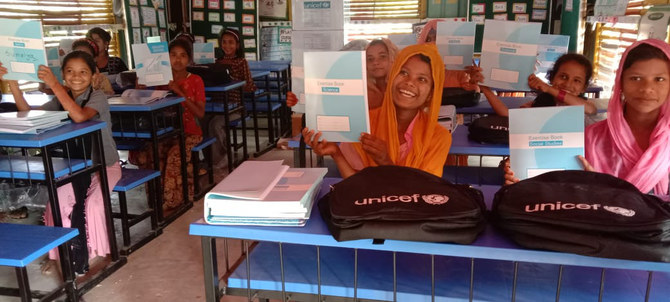DHAKA: Rohingya children living in refugee camps in Cox’s Bazar are progressing with their Myanmar education, with the arrival of new textbooks setting a government and UN-backed program on course to prepare the hundreds of thousands of children for a future return to their home country.
Around 400,000 school-aged children are among more than 1 million Rohingya Muslims living in the fishing port in southeastern Bangladesh who had sought refuge in the neighboring country after fleeing violence and persecution in Myanmar.
The refugee camps in Cox’s Bazar are now host to 3,400 informal learning centers run by UN agencies and aid partners, which provide basic education to over 300,000 students.
Bangladeshi authorities and the UN launched the Myanmar Curriculum Pilot project last November, a program aimed at preparing Rohingya children for a future return to their country. It was stalled for one year and a half due to the COVID-19 pandemic.
“The MCP was launched in November 2021. UNICEF aims to scale up in phases so that by 2023, all school-aged children are taught through the Myanmar curriculum,” Moyukh Mahtab, UNICEF spokesperson based in the Bangladeshi capital Dhaka, told Arab News.
The arrival of new textbooks this week marked the beginning of the formal education portion of the project, with more detailed lessons now becoming part of their routine after previously receiving only basic education and general knowledge. With the pilot project, UNICEF hopes to enroll at least 10,000 children by the end of this month.
“Under the MCP, Rohingya refugee children are taught English, mathematics, sciences and social studies, including history and geography,” Mahtab said.
Khan Mohammed Ferdous, an education sector lead of UN aid partner Brac at Cox’s Bazar, said the students go to classes six days a week and spend at least three hours daily there.
“Common placement tests were conducted to find the competency of the students, and based on this the students were enrolled from grade six to nine. Five teachers will be there in each of the learning centers to teach all the subjects,” Ferdous told Arab News.
The Myanmar curriculum, in which lessons are taught in English and the official Myanmar language, Burmese, has brought hope to the Rohingya children in Cox’s Bazar.
“Now, I can continue my study just like in my homeland. After returning home, I would be able to communicate with the people in my community,” sixth grader Hafsa Akter, who dreams of becoming a doctor, told Arab News.
“If we receive a standard education, it will help us in pursuing a good career. I want to be a politician after completing my education because, with this profession, I would be able to change the fate of our community,” seventh grader Moung Soe Myint told Arab News.
“Now I can dream of a better future.”
Nur Khan, a prominent human rights activist in Bangladesh, said authorities in the country should partner with UN officials to engage their Myanmar counterparts in discussions and ensure refugee children can also receive certification for their studies that are acknowledged in Myanmar.
“And the discussion should also include and ensure a dignified and voluntary repatriation of the refugees,” he told Arab News.
























